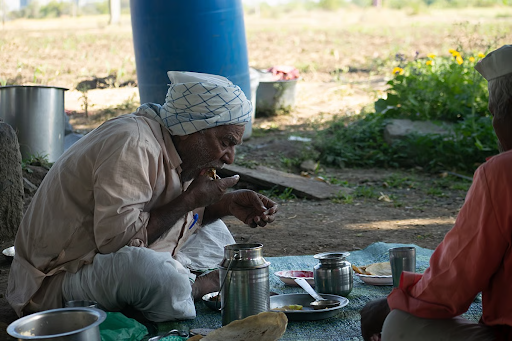



The EAT-Lancet report shows under 1% of humanity lives within safe, equitable planetary limits. Current food systems drive ecological collapse and inequality, demanding a shift to plant-forward diets, halved food waste, and just policies for global health and sustainability.

Copyright infringement not intended
Picture Courtesy: DOWNTOEARTH
The EAT-Lancet report warns that less than 1% of humanity lives in a ‘safe and just space,’ where basic needs are met without harming Earth’s vital systems.
The EAT-Lancet report is the result of a global scientific commission that provides evidence-based guidelines for a "Great Food Transformation" to ensure healthy diets from sustainable food systems for the world's population.
It is a collaboration between EAT, a non-profit working on global food systems, and The Lancet, a renowned medical journal. The most recent edition was published in October 2025.
Key Concepts
Planetary Boundaries: It identifies nine critical Earth system processes that maintain the planet's stability (e.g., climate change, biodiversity, freshwater use). These boundaries define a "safe operating space" for humanity.
The 'Safe and Just Space': Combines environmental limits with social foundations.
The report's conclusion is that our current food system fails on both fronts, pushing us into a high-risk zone environmentally while failing to provide justice for billions.
Driving Environmental Collapse
Climate Threat: Food systems are responsible for about 30% of global greenhouse gas emissions. The report warns that even if we halt all fossil fuel use today, emissions from food production alone would make it impossible to limit global warming to 1.5°C.
Resource Depletion: Industrial agriculture is the leading cause of biodiversity loss, deforestation, and the disruption of nitrogen and phosphorus cycles due to excessive fertilizer use.
Fueling a Global Health Crisis
Planetary Healthy Diet: Report advocates for a diet rich in plants—vegetables, fruits, whole grains, legumes, and nuts—with moderate, optional inclusion of animal products.
Global Dietary Deficit: Current diets are highly imbalanced. While over a billion people remain undernourished, many populations consume excessive amounts of meat, dairy, sugar, and ultra-processed foods, fueling a pandemic of obesity, diabetes, and heart disease.
Health Payoff: A global shift to this healthy diet could prevent an estimated 15 million premature deaths each year.
Deepening Social Inequity
Worker Exploitation: The present system is built on injustice. Nearly one-third (32%) of all food system workers globally earn less than a living wage.
Consumption Divide: The wealthiest 30% of the world's population are responsible for over 70% of the food system's environmental impact.
Hunger Paradox: We produce enough food to feed everyone, yet systemic failures in distribution and access mean over one billion people are still undernourished.
The Double Burden of Malnutrition: India faces a "double burden"—high rates of child stunting and wasting co-exist with a rising epidemic of obesity and non-communicable diseases in urban areas. This reflects the global dietary imbalance the report highlights.
Intense Agricultural Stress: As an agricultural powerhouse, India's natural resources are under severe strain.
Vulnerability of Farmers: Majority of farmers are smallholders who are highly vulnerable to climate shocks, price volatility, and economic exploitation. The report's call for fair wages and decent working conditions is directly applicable.
An Opportunity in Tradition: India's diverse culinary traditions, rich in millets, legumes, and vegetables, offer a powerful cultural foundation to transition towards a "planetary healthy diet."
Promote Healthy and Traditional Diets: Make nutritious, plant-rich foods affordable and accessible.
Adopt Sustainable Production: Implement practices like agroecology and precision farming to improve soil health, conserve water, and store carbon.
Halt Agricultural Conversion: Protect forests, grasslands, and other vital ecosystems from being converted into farmland.
Halve Food Loss and Waste: Cut waste across the entire supply chain, from farm to consumer.
Ensure Fair Livelihoods: Guarantee decent working conditions and living wages for all food workers.
Empower Marginalized Voices: Give farmers, women, and indigenous communities a meaningful role in shaping food policy.
Recognize and Protect Marginalized Groups: Ensure that the food system serves the needs of the most vulnerable.
Create Accessible Food Environments: Design policies and infrastructure that make healthy choices the easy choice for consumers.
The EAT-Lancet report urges radical food system transformation. For India, it offers a roadmap to nourish people, empower farmers, and heal the planet, turning immense challenges into sustainable opportunities.
Source: DOWNTOEARTH
|
PRACTICE QUESTION Q. The pursuit of development without justice is unsustainable, and justice without sustainability is unattainable. Critically analyze. 250 words |
The report argues that global food systems are failing both humanity and the planet, threatening climate stability and human health. The core message is that an urgent and "Great Food Transformation" is necessary to provide healthy diets for a growing population within the Earth's ecological limits.
The "safe operating space" is a framework that combines scientific targets for human health and environmentally sustainable food production. Operating within this space would allow humanity to provide healthy diets for a global population of around 10 billion people within the Earth's biophysical limits.
The Planetary Health Diet is a flexible, plant-forward diet promoting nutritional adequacy while minimizing environmental impact. It prioritizes whole grains, fruits, vegetables, nuts, and legumes, with reduced consumption of meat and dairy, and very low intake of red meat, added sugars, and saturated fats.






© 2026 iasgyan. All right reserved